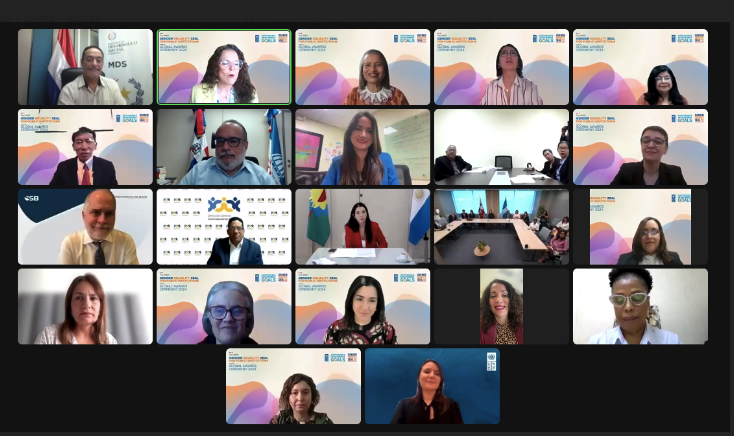
In institutional strategies for addressing gender-based violence, a comprehensive approach involves taking into account at least: prevention, protection and comprehensive reparation for victims of gender-based violence.
With this approach in mind, the second session for the exchange of experiences between participating institutions in the Seal took place in webinar format on 9th december 2022, and gathered 15 public institutions from 6 countries. It addressed prevention, protection and comprehensive reparation for victims of gender-based violence, a fundamental condition for ensuring safe, healthy and inclusive work environments in the participating institutions.
The dynamics of the session was developed through discussion groups where representatives of the institutions commented on the institutional mechanisms and practices put in place to generate work environments free of violence and discrimination. The discussion generated important reflections that are summarised below.
In order for institutions to implement comprehensive strategies that include prevention, protection and reparation for victims, the support of all institutional areas, including management, is required. These strategies must consider breaking the cultural patterns that feed the social norms that normalise violence and impede talking openly about it. In this sense, it is essential that institutions generate mechanisms and safe spaces for staff to talk openly about the issue, in order to end the existing ignorance and open the discussion for the design of effective mechanisms for prevention, protection and reparation.
Secondly, protocols on gender-based violence must be accompanied by communication and socialisation within public entities, so that people who face violence are able to recognise it, helping to undermine those myths and social norms that sustain the normalisation of violence.
Likewise, the protocols must consider mechanisms that generate security for the victims in terms of guaranteeing the absence of re-victimisation, reprisals or risk in relation to the job. To this end, it is essential that there are institutionalised committees for dealing with complaints, made up of professionals from different disciplines, who are adequately trained, to ensure this.
It is also essential to distinguish whether we are dealing with violence, discrimination or harassment. These three issues are not dealt with in the same way, which is why it is necessary that the people who make up the committees know how to deal with each one in an specific way. To this end, it is essential that all staff are also made aware of the importance of understanding each of these violations of rights. The importance of prevention should be highlighted through training and awareness-raising, not only among the committee members, but also outside the mechanisms, among the public.
Finally, the approach to gender violence and the implementation of protocols requires institutional accompaniment and coordination.
But for all this, it is necessary that the institution establishes a specific budget for addressing gender-based violence and discrimination. Lack of budget and institutional resistance to addressing these policies are two of the major barriers and challenges identified.











